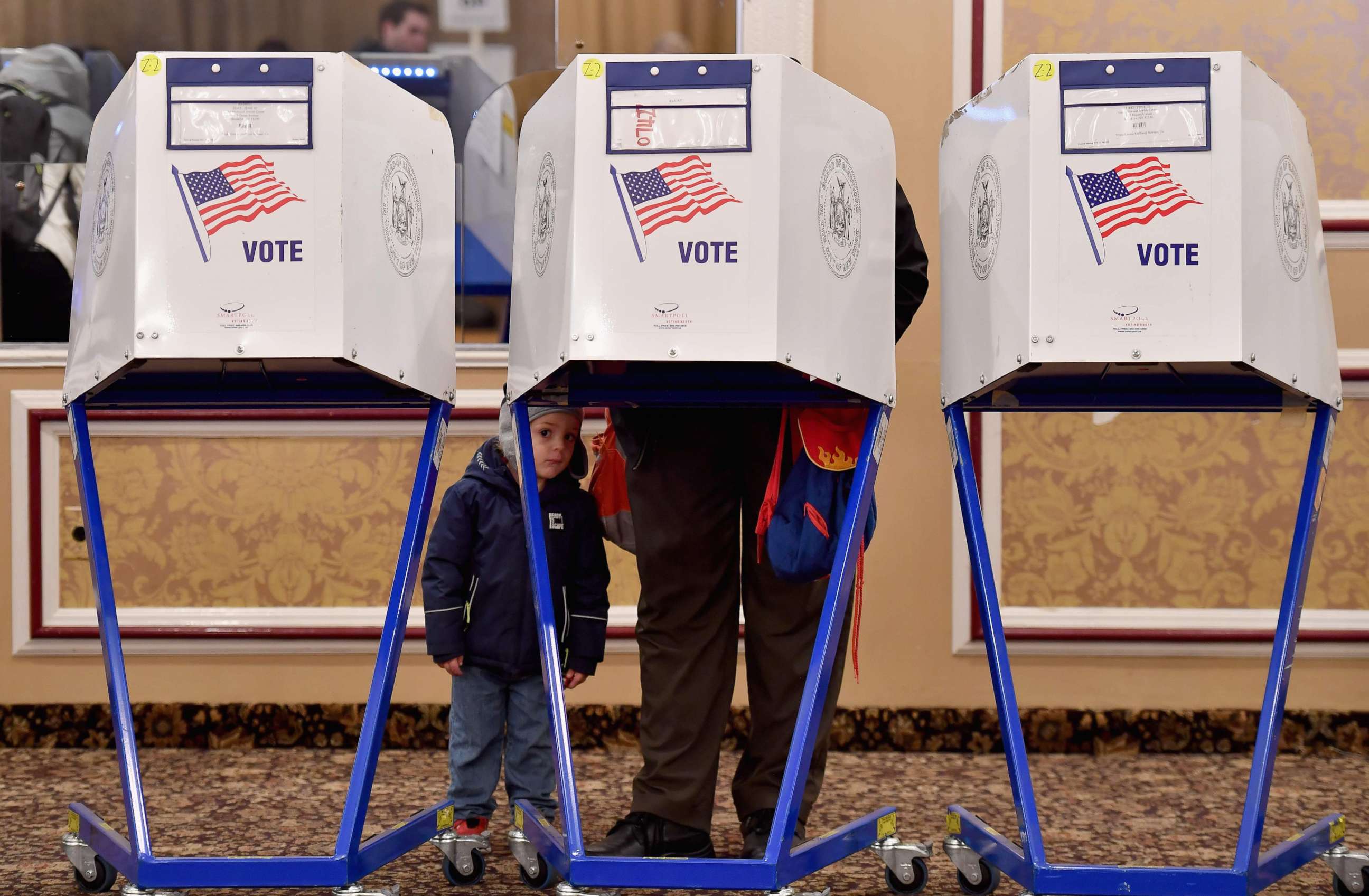In crucial 2020 states, voting rights hurdles loom ahead of elections
Massive voter purges are putting voters at risk of ineligibility ahead of 2020.
Wisconsin, Georgia and Ohio have become the battleground for voting access issues as an onslaught of roll purges and absentee ballot qualifications are poised to be an issue for voters in the 2020 election cycle.
Voter registration rolls are often a point of contention and a target for frequent changes, something voting-rights groups argue is an attempt to whittle down members of some groups who tend to vote Democratic.
A new report from the Brennan Center found that between 2016 and 2018, counties with a history of voter discrimination purged voters from rolls at much higher rates than other counties.
The study found 17 million voters were purged nationwide between 2016 and 2018. Another 16 million were purged between 2014 and 2016, according to a separate study from the center.
"Out-of-date rolls are just easy targets for folks who don’t actually care at all about voters, but want to do anti-voter initiatives and to have some cover," Myrna Pérez, Director of the Brennan Center’s Voting Rights and Elections Program, told ABC News.
Mass voter roll clean-outs began in 2013 after the Supreme Court ruled on Shelby County v. Holder, which rolled back many voter protections that were included in the Voting Rights Act of 1965. Before the high court's decision, Section 5 of the Voting Rights Act required jurisdictions with a history of discrimination to submit proposed changes in voting procedures to the Department of Justice or a federal court for approval.
"I think there really is not a dispute that election administrators should take the steps to make sure they are as clean as possible. The problem happens when purges are sloppy, large, or in violation of a federal law, and the question of when does (a voter) fall into one category or another category is increasingly a subject of very intense conversation," Pérez said.
Wisconsin to purge more than 200,000 voters
A Ozaukee County judge ordered Wisconsin state election officials on Dec. 13 to purge 234,000 voters from the rolls, in a victory for state conservatives who argued the Wisconsin Elections Commission was not abiding by state law.
Attorney General Josh Kaul, in conjunction with the election commission, filed a notice on Dec. 16 to appeal that ruling and is seeking to stay the judge’s order, according to the Milwaukee Journal Sentinel.
In October, the elections commission sent a letter to those purged voters who may have moved either in-state or out of Wisconsin, asking them to update their registrations or confirm their current address.

"This mailing is designed to help people who may have moved within Wisconsin make sure they’re ready to vote next year. It will not keep anyone eligible from voting," Meagan Wolfe, Wisconsin’s chief elections official, said in a press release about the letter. "If you move, even to an apartment in the same building, you must update your voter record by reregistering."
The judge's ruling was part of a lawsuit brought by the conservative Wisconsin Institute for Law and Liberty in November, led by three voters who argued that election officials were putting "Wisconsin’s election integrity at risk by intentionally ignoring state law to allow voter registrations and old addresses to remain active," according to a press release from the institute.
The commission was slated to remove these voters from the rolls in 2021 if it had yet to hear from them, according to the Journal Sentinel, but the decision by the state judge moves up that timeline to before the 2020 presidential election.
State law requires election officials to remove voters from the rolls 30 days after sending letters if they do not get a response.
Despite the order, the election commission confirmed to ABC News that the commissioners failed to approve a motion that would have instructed the group to move forward with removing voters within seven business days of a judge-issued written order.
Democratic Gov. Tony Evers, who defeated Scott Walker in 2018 by less than 30,000 votes, took to Twitter to slam the order: "This move pushed by Republicans to remove 200,000 Wisconsinites from the voter rolls is just another attempt at overriding the will of the people and stifling the democratic process."
President Donald Trump won the state by fewer than 23,000 votes in the 2016 election.
Georgia removes thousands of voters from rolls
This week, the Georgia secretary of state removed 300,000 voters who are classified as inactive, from its rolls.
U.S. District Judge Steven Jones on Dec. 16 allowed Georgia to go forward with its plans to cancel the voters, hours after 2018 gubernatorial candidate Stacey Abrams’ voting rights group, Fair Fight Action, filed an emergency motion seeking to block some of the cancellations under the stipulation of a new law that allows voters nine years of maintaining "inactive" status before they are removed.
On Thursday, 22,000 of those voters had their registrations restored after an error in the way the state's voting history had been screened was discovered, The Associated Press reported.
Abrams, who secured more votes than any Democrat in Georgia's history, lost the 2018 gubernatorial race by 54,723 votes to Republican Brian Kemp, who at the time, in his role as secretary of state, oversaw all election activity.

Earlier this year, lawmakers enacted a provision forcing the state to remove voters if they have been "inactive" for more than three years.
Election officials next week will mail a notice to the last known address of voters who hold "inactive" status, according to a release by the secretary of state’s office. The office will also post online the list of voters who have been removed.
"Federal law says [notification] needs to be done within 90 days of a federal election. And that includes primaries. And that is a minimum," Pérez said. "Depending on how big the list is, and how good your data is, and how much public trust you have, and what your error rate is like, you may want to do it earlier than that."
In 2013, the Supreme Court ended federal oversight of local election decisions under the Voting Rights Act, leaving Georgia voters subject to multiple intensive voter roll clean-outs and precinct closures.
Precinct closures, which resulting in longer distances to travel to polling places, prevented anywhere from 54,000 to 85,000 voters from casting ballots on Election Day last year, according to a new report from the Atlanta Journal Constitution, which detailed the impacts of precinct closures across the state.
From 2012 to 2018, county election officials shut down 8% of the state's polling locations and relocated nearly 40% of the precincts. In that same time, the average Georgia voter’s distance to a polling place more than doubled, according to the report.
Trump won the state by five points in 2016.
Ohio denies thousands of absentee applications
In the Buckeye State, the Associated Press conducted an extensive review of absentee applications that were denied and found that "thousands of Ohio voters were held up or stymied in their efforts to get absentee ballots for last year’s general election because of missing or mismatched signatures on their ballot applications."
The state has increasingly moved to mail-in ballots in recent cycles, after "early, no-fault absentee voting was instituted in 2005," according to the AP, which noted, "the signature requirement on such applications is a largely overlooked and a spottily tracked step in Ohio’s voting process."
Figures given to the AP found 21 counties rejected more than 6,500 absentee ballot applications because a signature was missing or didn't match what was on file.
Twelve counties recorded encountering no signature issues, while remaining responding counties said they didn't track how many applications they rejected, making it difficult to track trends in application denial, according to the review.
Ballot access continues to be a deeply partisan issue, with Ohio Democrats lambasting the state's Republicans, who they claim "have put in place one barrier after another for voters."
"This report is just the latest example of how they have made it harder for Ohioans to cast a ballot and have that ballot counted," officials with the Ohio Democratic Party said in a press release.
In 2014, thousands of ballots were tossed out in Ohio due to the "perfect match" requirements, passed by a Republican-led Ohio state legislature that year to require voters to accurately "fill out their personal information on absentee or provisional ballots or they will be rejected -- even if the votes are otherwise valid," according to Reuters.
Despite President Barack Obama winning Ohio twice, President Trump carried the Buckeye State by 8 points in 2016.




